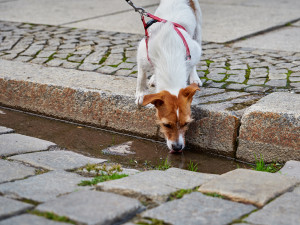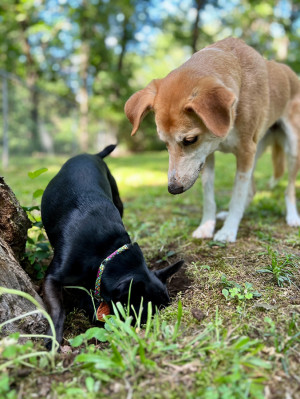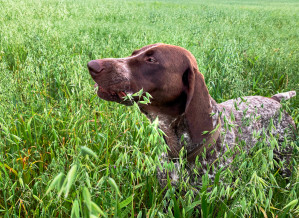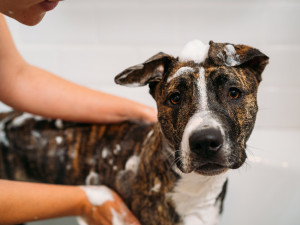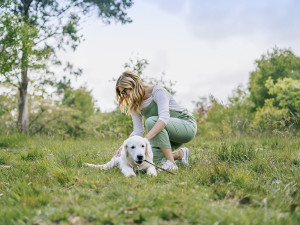Puppy Parasites 101: What You Need to Know to Keep Your Pup Safe
Does your pup have a pot belly? Have you noticed something moving in their poo? Yes, it’s time to talk about puppy parasites
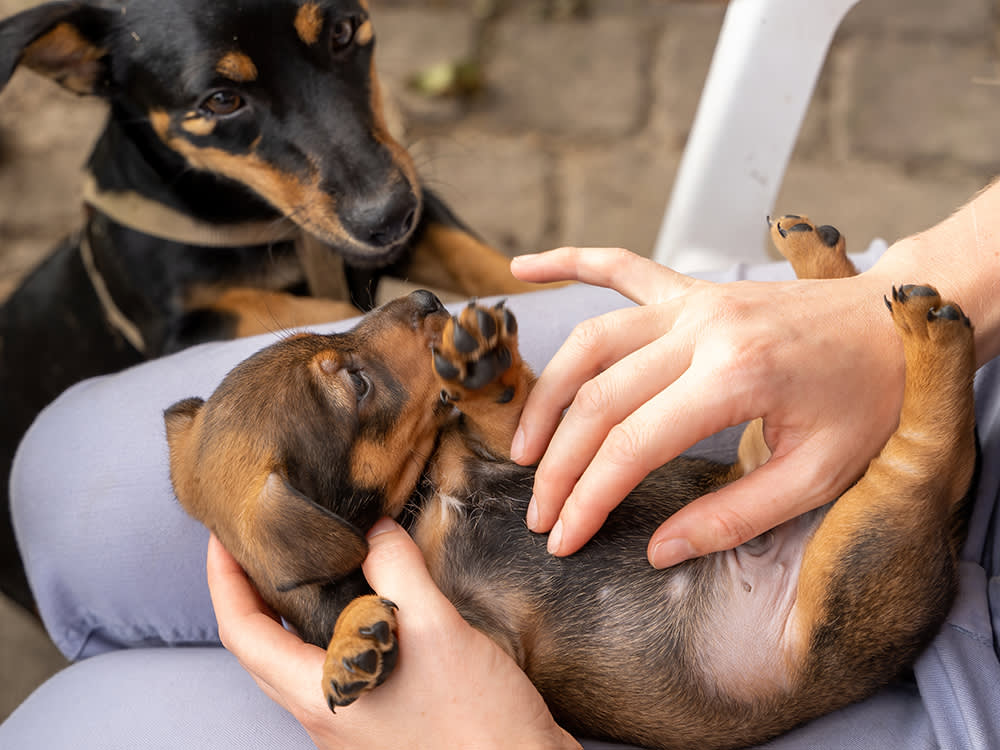
share article
If you’re a new pet parent and you’ve noticed something strange (maybe even wiggling) in your pup’s poo, been concerned about your puppy’s potbelly or reached out to your dog’s vet about bloody diarrhoeaopens in a new tab, you aren’t alone. The majority of the time, the answer to these questions points to a group of nutrient-depleting and blood-sucking culprits: intestinal parasites. Time to read up on some important information about intestinal parasites and your pup’s pooing habitsopens in a new tab.
What is a parasite?
A parasiteopens in a new tab is an organism that feeds and lives on or in another animal such as a dog, causing them harm or even death. Intestinal parasites can range in size, shape, route of transmission and how they affect dogs. But as the name suggests, they’re found somewhere along the pet’s gastrointestinal tract like the stomach or small and large intestines. Puppies are more likely to have severe symptoms from parasites because blood and nutrients are being taken away during a crucial time of growth and development.
How do puppies get parasites?
There are many ways a puppy can get infected with a parasite because they can be transmitted differently for each kind of intestinal parasite. Your puppy may get a parasite by doing something as simple as standing on grass that has parasitic larvae on it, through a flea bite or they can even be born with it. How is that possible? It all goes back to mum.
If a pregnant mum gets infected with an intestinal parasite, the parasites may transmit while they are still in utero. Another possible route from mum to puppies is during nursing, where the parasite is transmitted through mum’s milk. But let’s say that while pregnant, the puppy’s mum tested negative for any and all possible intestinal parasites. However, a few months ago, she tested positive and completed the entire deworming process. During the initial infection, it’s possible that some of the parasitic larvae migrated into muscle tissues, where they lay dormant until the perfect opportunity – in this case, pregnancy – arose.
Common puppy parasites
Now that you’re aware of these pests, it’s time to dive into the nitty-gritty of intestinal parasites. Below you’ll find a list of the most common intestinal parasites your pup can get, how they’re transmitted, symptoms to look for and different treatment options and preventative measures that should be considered.
Hookworm
One common puppy parasite is ancylostoma caninum, commonly called hookworm. There are several ways a pup might be infected with hookworm, including: through ingestion of contaminated poo or soil, when a parasite larvae burrows through the skin (seriously) when standing or laying on contaminated ground, prenatal infection (from mum to offspring in utero) and transmammary infection (from mum to offspring while nursing). Hookworms are zoonotic parasites which means they can be transmitted to humans. Symptoms of hookworms in dogs include:
dry or dull coat
anaemia
pale gums
lethargy
bloody diarrhoeaopens in a new tab
significant weight loss or inability to gain weight
Treatment for hookworms is usually oral dewormers (anthelmintics). Because they only kill adult worms, your pup will need to repeat treatment about two to four weeks after the first treatment.
Roundworm
Another parasite to watch out for is roundworm (toxocara canis and toxocara leonina). Puppies can get infected with roundworms by, you guessed it, sniffing or licking infected poo from another animal. They can also get roundworms if they eat other animals like rodents, earthworms and birds which are infected by roundworms. Similar to hookworm, it’s also possible to get roundworms through both prenatal and transmammary infection. And, yes, roundworms can be transmitted to humans too. Just like hookworms, your pup will need to go through two rounds of oral dewormers to treat their roundworm infection. Symptoms of roundworms in dogs include:
’spaghetti’ in your pup’s poo or vomit
recurrent diarrhoea
potbelly (puppies)
lethargy
stunted growth (puppies)
Giardia
Dogs often get infected by giardiaopens in a new tab (giardia duodenalis) by drinking water that has been contaminated by poo from an infected animal, but they can also get it by eating something contaminated by infected poo like grass or dirt. Not all pets show symptoms of giardia. When dogs do show symptoms of giardia, they include:
diarrhoea
lethargy
dehydration
weight loss
inability to gain weight
Vets will typically prescribe a combination of fenbendazole (dewormer) and metronidazole (antibiotic) for about 10 days as a treatment for giardia. After that, your pup will need to be retested two to four weeks after finishing the medication.
Whipworm
Another common parasitic worm in dogs is the whipworm (trichuris vulpis). Pups can get infected with whipworm by accidentally eating eggs present on contaminated soil, grass or poo. Common symptoms of whipworms include:
chronic watery, bloody diarrhoea
significant weight loss
general debilitation (inability to conserve salt, leading to chronic dehydration)
It’s tough to test for whipworms because they rarely pass eggs, so faecal samples often come back false negative. The most common dewormers used to treat whipworms are fenbendazole and febantel.
Tapeworm
Like many of these parasites, it’s pretty easy for your pup to be infected by tapeworms. Your pup can be infected with tapeworm (dipylidium caninum) if they eat an infected flea, undercooked or raw meats or contaminated faeces. Unfortunately, some forms of the taenia and echinococcus species of tapeworms can also be transmitted to humans. Symptoms of tapeworm in pups include:
moving rice-like segments found around pup’s bum or in their poo
weight loss
diarrhoea
lethargy
distended abdomen
Tapeworms often don’t show up on faecal screenings but can be seen without a microscope (wiggling stuff in your pup’s poo). Treatment of tapeworm in dogs consists of one or two rounds of praziquantel dewormer, which generally covers all tapeworms types. Though sometimes, pets may be treated with fenbendazole, which does not kill dipylidium caninum.
Preventing puppy parasite infections
If all this information has you thinking about the last time you had your pup tested for intestinal parasites, this is your sign to get your dog’s poo checked. Intestinal parasites can be very scary, and while treatment is usually easier than you might think, prevention is always best.
Make sure your new pup is up-to-date on their immunisations.
Pick up your dog’s poo to prevent the spread, transmission and reinfection of the parasite.
Practice good hygiene, like washing your hands after picking up faeces.
Make sure your pup has clean water accessible at all times to avoid drinking from puddles.
Limit exposure to areas where excessive dog poo will be.
Many heartworm preventatives contain deworming medication that will kill intestinal parasites.
If your pup is experiencing any of the symptoms mentioned, do your dog and yourself a favour and get their poo tested for possible parasites. It’s easy. To test their poo, simply bring in the freshest poo sample you can find and the clinic staff will do the rest. Vets typically will have results generally within the next 24–48 hours.

Agnes Molek, MA
Agnes Molek has her Master’s degree in Biology through Chicago Zoological Society’s Brookfield Zoo connection to Miami University Oxford. She has a Bachelor’s in Biology with a minor in Psychology. She is a veterinary technician at a small animal and exotic veterinary clinic and has two very energetic hounds named Kona and Kaiser.
Related articles
![Two dogs digging outside in the dirt.]() opens in a new tab
opens in a new tabTypes of Worms In Dogs: How to Detect and Treat Worms In Dogs
Here are the types of worms your pup could get, how you know they have them in the first place and how to get rid of them for good
![Kurzhaar's dog eats grass, oats, happy puppy playing in the meadow]() opens in a new tab
opens in a new tabWhy Do Dogs Eat Grass?
When to worry about your pup’s grass consumption (and when it’s not a problem)
![Dog standing in the bathtub covered with a green towel after a bath.]() opens in a new tab
opens in a new tabStep-by-Step Guide: Expressing Dog Anal Glands Safely & Effectively at Home
Yeah, it’s not exactly pleasant – but your pup will thank you
![A dog getting a bath]() opens in a new tab
opens in a new tabHow Often Should You Wash Your Dog?
“If your dog is stinky or looks dirty, wash them!” Plus, more tips from LA dog groomer Jess Rona
![A woman checking her dog for ticks outside in a grassy field.]() opens in a new tab
opens in a new tabLyme Disease in Dogs: What Every Dog Parent Should Know
We asked a vet for tips on how to prevent the tick-borne Lyme disease in dogs


